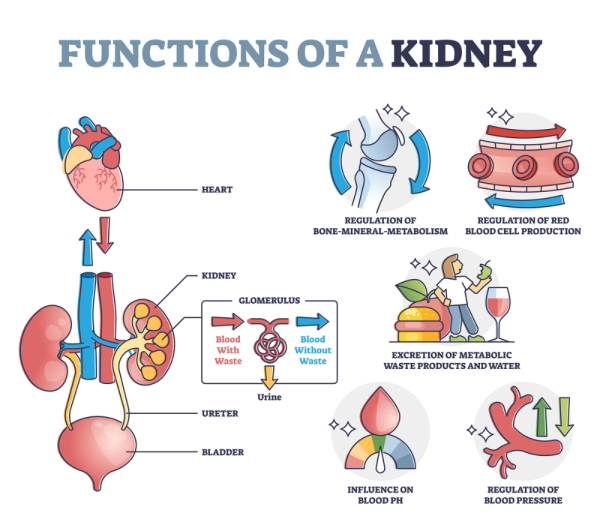You can now add Healthify as a preferred source on Google. Click here to see us when you search Google.
Kidney function blood tests
Also known as renal function tests
Key points about kidney function blood tests
- Kidney function tests are a group of blood tests done to find out how well your kidneys are working.
- The tests measure waste products and other substances in your blood.
- They can be done as part of a routine blood test or if you have a condition that affects, or may affect, your kidneys.
- A urine test may also be done to check for protein or other signs of kidney damage.
- Kidney function tests can help diagnose or monitor kidney disease, dehydration, or how your body is handling certain medicines.
- They’re especially important if you have conditions such as diabetes, high blood pressure, or heart disease.

Kidney function tests are a group of blood tests that show how well your kidneys are working. The tests measure waste products, minerals, and electrolytes in your blood to check if your kidneys are doing their job properly.
A urine test may also be done to check for protein or other signs of kidney damage.
Kidney function tests can help diagnose or monitor kidney disease, dehydration, or how your body is handling certain medicines. If you have a long-term condition such as diabetes or high blood pressure, regular kidney function checks can help prevent complications.
What do your kidneys do?
Your kidneys filter waste products and extra water from your blood to make urine (pee). They also help control your blood pressure and balance levels of salt and minerals (eg, sodium, potassium and calcium) in your body.

Image credit: Depositphotos
If your kidneys aren’t working properly, waste products and fluid can build up in your blood and cause serious health problems.
Read more about how your kidneys work.
Kidney function tests measure the levels of waste products and electrolytes in your blood.
- Creatinine – this is a waste product made by your muscles. Your kidneys usually filter creatinine out of your blood into your urine. High levels of creatinine in your blood can mean your kidneys aren't working well.
- eGFR (estimated glomerular filtration rate) – this is calculated using your creatinine level, age, and sex at birth. It shows how well your kidneys are filtering blood. A low eGFR means you have reduced kidney function.
- Electrolytes – these include sodium, potassium, chloride, and bicarbonate. They’re important for many of your body’s functions, including nerve and muscle function. Abnormal electrolyte levels may be a sign of kidney problems.
- Urea – this is a waste product produced when your body breaks down protein. High levels may mean kidney problems or dehydration.
Urine tests for kidney health
Sometimes a urine test is also done to check for protein (albumin). Healthy kidneys don't let much protein into your urine (pee). If your kidneys are damaged, protein can leak into your pee – this is called albuminuria or proteinuria. The less albumin in your urine the better.
The lab can also measure your urine ACR or urine albumin-creatinine ratio. A high urine ACR may be a sign of kidney disease.
Your urine may also be tested for blood, glucose, or signs of infection.
Many different conditions can affect how your kidneys work. A kidney function test can’t diagnose a health condition but can find out if there is a problem with how your kidneys are working.
You might have a kidney function test:
- as part of a general health check
- if you have signs of kidney problems, such as swollen ankles or feet, tiredness, or changes in peeing (eg, having to pee more or less often)
- to check for kidney disease if you have risk factors, such as diabetes or high blood pressure
- to check for dehydration
- to monitor your kidney function if you have kidney disease
- before or after starting medicines that could affect your kidneys
- if you're pregnant or have certain conditions such as lupus or heart disease
- if you have, or may have, a kidney stone blocking the tube between your kidney and bladder (ureter).
You don’t need to prepare for a kidney function blood test, and you can have the test at any time of the day. The urine albumin or urine ACR test is best done in the early morning if possible.
A healthcare provider will use a small needle to take a blood sample from your arm. The sample is collected in a tube, which is sent to the laboratory for testing. Read more about blood tests.
You can also read about the common types of urine sample you may be asked to provide.
Your healthcare provider will explain your results and let you know if more tests are needed.
Reduced kidney function might indicate a temporary problem, such as dehydration, or a long-term condition, such as chronic chronic kidney disease.
Kidney function tests are just one part of the picture. Other tests and your overall health are also considered if you have abnormal kidney function test results.
The following is further reading that gives you more information on kidney function tests. Be aware that websites from other countries may contain information that differs from New Zealand recommendations.
Blood test safety information(external link) Awanui Labs, NZ
Understanding your kidney function results(external link) Health New Zealand | Te Whatu Ora, NZ
Brochures
What you should know about testing your kidneys(external link) Pathology Tests Explained, Australia
References
- Routine kidney function blood test(external link) Patient Info, UK, 2024
- Kidney function tests(external link) Pathology Tests Explained, Australia, 2023
Credits: Healthify editorial team. Healthify is brought to you by Health Navigator Charitable Trust.
Reviewed by: Dr Grace Lee, FRNZCGP and Clinical Educator
Last reviewed:





